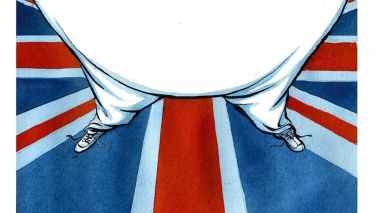It is several years since Anna Funder published Stasiland, her acclaimed book about East Germany. Her new book is a novel concerning a group of German political activists surrounding the writer Ernst Toller, who is now almost forgotten but once was well known and was president of the short-lived Bavarian Republic in 1919 for about a week. Funder’s point of entry is Ruth, who, some 60 years later as a very old lady in Australia, receives in the post a copy of Toller’s auto-biography, I Was A German, with some manuscript amendments made by him in the week before he died, in 1939.
Despite the gap in time and place, they are united by their passionate attachment to Ruth’s cousin, Dora Fabian, who was Toller’s amanuensis and the love of his life. Dora was tireless in her resistance to Hitler both in Germany and, after her exile, in London in the early 1930s, where the group attempted to alert the British, and the world, to Hitler’s danger. Impoverished, isolated, caught between fear of Nazi agents operating in London and the disingenuous British requirement that refugees should not engage in political activities, their efforts apparently came to nothing. Although history justified their fears and actions, it has forgotten them.
The novel is structured as a counterpoint between Ruth and Toller in what proves, for each of them, the last week of their life. Intercut with Ruth’s reflections on the events of long ago is her wry, shrewd commentary on her present condition and surroundings. Toller’s part is anchored to a New York hotel room in 1939, where he dictates to another young émigrée the amendments that eventually find their way to Ruth. Perceiving the failure of his political and literary achievements, he is anxious to write Dora into the central position that his published autobiography denied her.
Suspended between these two poles is a brilliant narrative showing how Toller, Dora, Ruth, her husband Hans and various others responded to the aftermath of the first world war, and the terrible difficulties confronting their continued endeavours in London. It is an ambitious structure but it works perfectly. Every part is beautifully rendered and balanced. Although intricately connected, the numerous threads are never confusing: as place, time and point of view shift back and forth, the reader knows where he is and is glad to be there.
It would spoil the book to say too much about plot and character because it works as a gripping spy novel, which is a function of its successful structure. Funder’s prose, however, raises the book to a different level. Here is Ruth watching a minor character walk away: ‘She leaves, square-bottomed and tidy as a tug, dangling a box of cakes in a stork’s triangle from the plastic bag on her arm.’ Observing Ruth after Dora’s death, Toller writes that she is ‘a picture of lopsided grief, a bull in the ring trying to outrun its pain.’ And, near the end, ‘Will the world forget we tried so hard to save it?’ The language is assured and precise, the syntax richly expressive.
Funder has not merely told the story of these forgotten people. By writing with such sensitivity of their loves and the ways in which they lived, as well as of their dramas and politics, she has written a superb novel that transcends its setting. It is not just a book about German political exiles in London. It is a novel about confronting grievous loss, and the horror of realising, as history closes over you, that you will never be understood.
It is a magnificent irony that, by rescuing those brave people with such consummate artistry, Funder has enabled them to reach into the future after all. This book is a wonder. Do, please, read it.




Comments